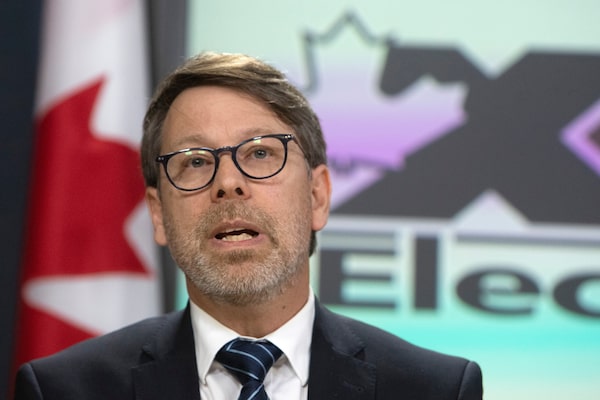
Chief electoral officer Stéphane Perrault holds a news conference to discuss Election Canada's services to electors for the upcoming election, in Ottawa, Sept. 17, 2019.Fred Chartrand/The Canadian Press
Elections Canada is ready to run a federal election during the COVID-19 pandemic, its chief electoral officer said, but recommends a number of changes be made to meet the logistical challenges it poses.
Stéphane Perrault appeared before the House of Commons procedure and House affairs committee Thursday, answering questions from parliamentarians about legislative changes he’s seeking to carry out an election during a pandemic.
“I think we have to be honest here, a national election is a logistical feat in the best of circumstances and these are not the best of circumstances," he said.
His comments come one day after an election was avoided when the Liberals made a Conservative demand to form an “anti-corruption committee” a vote of confidence. The NDP, Green and two independent MPs voted with the Liberals to defeat the motion.
Mr. Perrault has recommended moving from a single voting day on Monday to a two-day polling period on Saturday and Sunday. He said weekend voting would allow a steadier flow of electors, greater physical distancing, assist in securing polling locations and provide a larger pool of workers available to staff polls.
He suggested mail-in-ballots be accepted until 6 p.m. ET on the Monday following the weekend of voting, provided they were mailed before polls closed. Mr. Perrault is proposing that Elections Canada be allowed to work with long-term care facilities to help ensure a safe voting process.
He said these proposals would require the government to table legislation to make changes to the Canada Elections Act, but they would be temporary, leaving the current electoral process intact.
Corinne Havard, a spokesperson for Intergovernmental Affairs Minister Dominic LeBlanc, who is responsible for democratic institutions, would not comment on whether the government intends to introduce legislation, but said it is reviewing the recommendations.
Mr. Perrault said if an election was called during the pandemic, he strongly encourages the government allow for the longest possible period before voting, which is 51 days. Doing so would help with logistical challenges such as setting up offices for returning officers, and allowing the time necessary to send and take delivery of millions of mail-in-ballots.
Members of Parliament questioned Mr. Perrault about whether Canada Post could handle the expected volume of mail, how Elections Canada plans to recruit staff, where polling stations could be set up if churches and schools are closed to the public, and what would happen in the event of a complete lockdown of a city or province.
He said he is not concerned with Canada Post’s ability to process mail safely, and that by voting on the weekend, he hopes to recruit young staff, acknowledging that many polling staff are older and may not want to work during a pandemic. When it comes to poll locations, he said the agency would work with local authorities to request access to larger facilities for the purpose of voting.
Only in an extreme circumstance, where health authorities force people to stay at home, he said, would an election possibly be cancelled. If that is the case, the writ would be withdrawn and the election rescheduled for three months later.
Mr. Perrault said Elections Canada has the resources necessary to conduct an election, including an additional $50-million it will need to spend on masks, hand sanitizer, prepaid postage for mail-in-ballots and a health and safety campaign. However, he said, they do not know the financial implications of voting on the weekend.
According to supplementary estimates tabled in the House, the Treasury Board authorized up to $802,189 to the Leaders Debate Commission to maintain limited operations and ensure the commission is ready to organize debates once an election is called.
Know what is happening in the halls of power with the day’s top political headlines and commentary as selected by Globe editors (subscribers only). Sign up today.